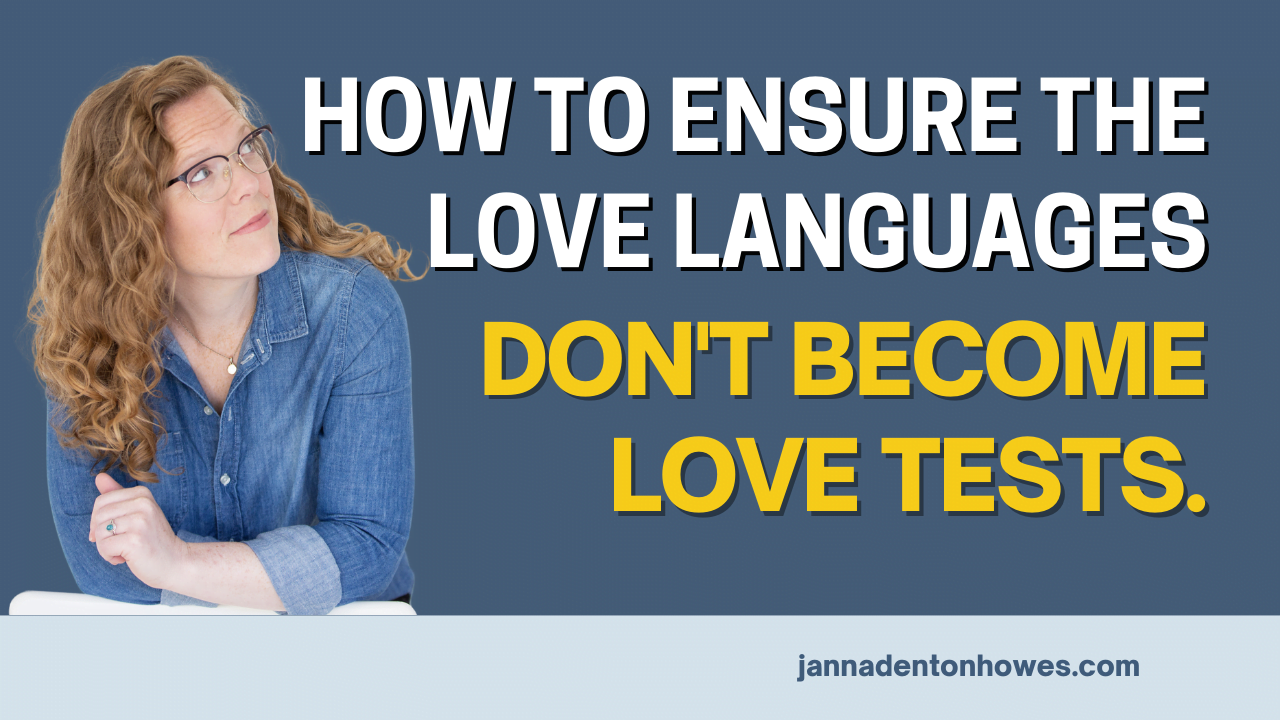People ask me about the popular Love Languages all the time, but I have a different opinion than most.
As a disclaimer, I’m not saying the concept isn’t helpful in relationships. They work beautifully when used correctly.
Yet, I often see the Love Languages misused, causing more harm than connection.
What are the Love Languages?
The Love Languages were created by Dr. Gary Chapman. He outlined five categories in which we express love. They are:
- Acts of service
- Gift-giving
- Physical touch
- Words of affirmation
- Quality time
He suggests we give love the same way we prefer to receive love. This becomes problematic if the people we love have a different love language than us.
For example, I like to receive words of affirmation so I express my love through words to my husband. His Love Language is physical touch, so our wires get crossed and we don’t reach each other.
In theory, the concept sounds lovely, but here’s what happened to me when I tried to use them in my marriage.
How the Love Languages backfired on me
I was standing in the kitchen with my mouth open wide in disbelief.
My husband had just uttered this fateful sentence (which would take us years to recover from): “If you aren’t going to be intimate with me, then I’m not helping you in the kitchen.”
OUCH!
The kids (who were only 4 and 5) were screaming in the background, the sink was full of dishes, and I hadn’t had a shower in two days.
Five days earlier, we had gone to a marriage workshop and learned The 5 Love Languages, based on the wildly popular book by Dr. Gary Chapman.
I had thought, “Brilliant! I’ll learn my Love Language (Acts of Service), my husband will learn his (Physical Touch), and we’ll have no disagreements and feel loved all the time!”
So what happened with the backfire in the kitchen?
Our Love Languages had become Love Tests!
What’s a Love Test? (glad you asked!)
A sneaky, tit-for-tat expectation that uses actions to PROVE love.
Actions can’t prove love.
We’re taught actions speak louder than words:
- I’ll believe it when I see it.
- I’ll believe it when I hear it.
- I’ll believe it when I’m shown through action
Here’s my point: You can contribute to each other’s happiness, but when actions become about proving love, everything breaks down.
Let’s look at some examples.
My husband is amazing at doing nice things for me. He’s happy to go to the store when I crave chocolate at night. He brings me home take-out when he’s at a restaurant. He’s a kind and generous man.
Acts of service are not in my nature. I don’t think about them often, but I know my husband loves Tim Hortons coffee.
Imagine I’m driving home and I see Tim Horton’s drive-thru. I think, “Oh, my husband would love a coffee. I’ll surprise him!”
I pick up a coffee. I surprise him. He’s feeling good. I’m feeling good. Wonderful!
Now, imagine I drive by the same drive-thru and think, “If I don’t get my husband coffee, he’ll think I don’t love him.”
“I better go get that coffee.”
Here’s another example. I look at my husband and think, “I really want to hug him right now.”
I go hug him and it feels so nice. We’re both feeling connected.
Now, imagine I look at my husband and think, “I have to hug him. If I don’t hug him, he’s going to get sulky. He’s going to think I don’t love him.”
“I better go hug him.”
In both examples, the first scenario is about choice, freedom, and wanting.
The second scenario is about expectation and obligation.
That’s not love.
What’s the solution?
Instead of expecting someone to express their love within a certain box so you can feel that they love you, go ask them!
If you’d like to know if they’re concerned about your needs, if they love you, if they’re proud of you, or if they think you’re smart, ask them.
They will tell you the truth.
If they happen to say, “You know what, I don’t care about you,” then at least you know. You can have a truthful conversation instead of making up stories about whether they’re speaking your Love Language, how they’re doing it, or if they’re doing it right, or often enough.
Life happens and people forget.
We’re all imperfectly human.
Don’t let the Love Languages become sneaky love tests.
Remember, when you look at actions to prove love vs. asking for what you need, you sabotage the Love Languages.
The Love Languages work beautifully as the icing on the cake. They represent fun and thoughtful ways to show your partner you care.
Remove the weight of expectation and obligation from love to experience a true connection with the people you care most about.
